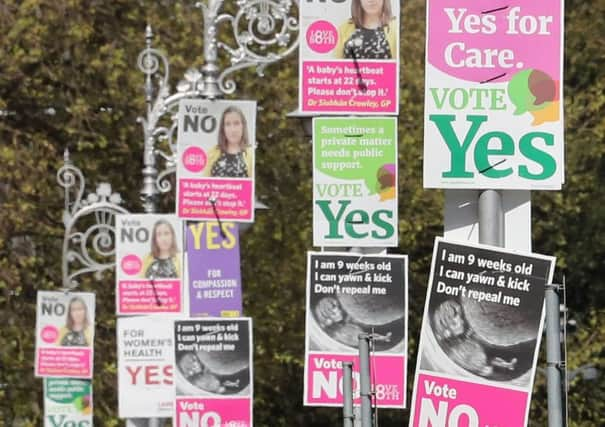Ben Lowry: Ireland thought hard about abortion, as we need to do in NI '” including a debate on abortion on demand


My own straw poll outside a polling station south of Dundalk yesterday (see link below) was a tiny sample that, if replicated elsewhere, would mean a big margin in favour of removing the Republic’s comprehensive constitutional bar on abortion.
But even if it is not so, and if voters have kept the amendment, it will not necessarily be evidence that the south is still dominated by the church, as many people might interpret such an outcome.
Advertisement
Hide AdAdvertisement
Hide AdI asked scores of people at Haggardstown how they had voted yesterday, and talked to a large proportion of those who would tell me how they had cast their ballot (many other people would not say, as always happens in an exit poll).
My report on page four only gives a small flavour of the things that people said to me, and is focused on those who would get their picture taken. But other people who spoke to me anonymously gave detailed reasons for their vote, and explained why they felt so strongly one way or the other, or outlined how torn they had been.
One woman said she fluctuated back and forth right up until she cast her vote. She had been a nurse “in the field” she said, without explaining what she meant by that (this is in addition to the midwife I quote in my story, with her poignant, indeed shocking, account of having baptised an “aborted boy”).
A man explained to me how for various reasons he had gone from being 90% Yes [ie for repeal] to 80%, to 70% to ending up 1% in favour of No, which is how he voted, due to his fear of where it would all end.
Advertisement
Hide AdAdvertisement
Hide AdPeople had given the matter a lot of thought, rather than just taken instructions from a church leader.
We are going to have to give the matter a lot of thought in Northern Ireland too. As with many issues, from hospital rationalisation to public sector reform to social matters, Stormont fears hard choices.
The limited push for abortion reform in the last assembly struck me as one that ducked the point: the emphasis was on victims of rape or families dealing with fatal foetal abnormality. But these tragic cases are a tiny fraction of abortions.
The real debate is over abortion on demand, which has barely been discussed at Stormont.
Advertisement
Hide AdAdvertisement
Hide AdOn all such topics we act as if Northern Ireland opinions are utterly removed from the rest of Britain and Ireland, but my sense is that is only by a small margin the most conservative part of the five-part UK and Ireland.
This is not to say that abortion on demand is a good thing but to acknowledge that it is facilitated almost everywhere in the western world early in a pregnancy.
In other words, the settled position in most countries is that a woman, not the state, decides in the first stages of a pregnancy.
It is the position in Germany and France and America, and might soon be so in Ireland too, yet it has barely been discussed here in NI.
Advertisement
Hide AdAdvertisement
Hide AdThis has led to things such as the sudden decisions to fund abortions for Northern Ireland women in other parts of the UK.
Curiously, while both parts of Ireland have largely ducked the abortion debate (until the Republic took it up recently) England has been similarly dishonest about the issue. Under the 1967 Abortion Act, terminations are only permissible on medical grounds but in practice it facilitates abortion on demand up to a grisly 24 weeks.
This leads to late term abortions that are so revolting they can barely get doctors to perform them.
It seems to me that the future legal position on terminations in many countries might be found somewhere between the highly restrictive position in Ireland (north and south) and the grossly slack position in Great Britain.
Advertisement
Hide AdAdvertisement
Hide AdTechnology is making it harder to close our eyes to the horror of late or even mid term abortion. It has led to development of drugs that perform early terminations.
My suggested future compromise will be of no comfort to Christian campaigners, who have told me that they see their biggest challenge as stopping early term abortions, of which there are so many.
I suspect abortion will become a bigger issue in the years to come and there will one day be a drive to slash the number of them, in the same way that our toleration of road deaths has declined over the years.
In the meantime, there is likely to be liberalisation on this island, and, ultimately I hope, massive tightening on the mainland.
• Ben Lowry (@BenLowry2) is News Letter deputy editor